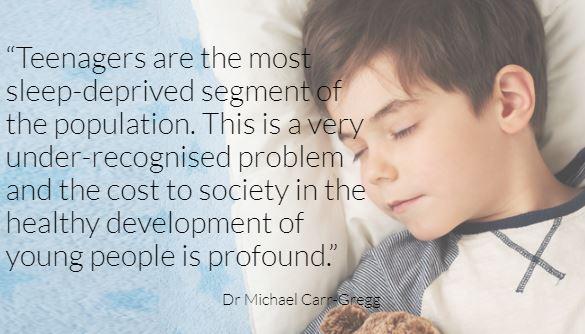Wellbeing

Student Wellbeing
Dear Parents and Caregivers,
Firstly, I would like to say what a privilege it is to have secured the position as Wellbeing Team Leader for the students and families at Edenhope College. As you might imagine, at this present time of global crisis and uncertainty, it has certainly been a busy and hectic introduction to this new role.
While the return of all students to onsite learning has been wonderful, it has also been quite clear that some things may take a little extra time to return back to normal. For the staff at the College, probably one of the most noticeable changes we have seen in students (across all year levels) thus far, is the impact that changed sleeping routines have had on student alertness, mood, and work ethic.
As many of you will know, having a good night’s sleep is one of the most essential elements of a healthy lifestyle and directly supports a students’ ability to learn effectively. During the remote learning period, we acknowledge that students were required to spend long hours on devices, and they were able to adjust sleep/work patterns to suit their own family circumstances. However, with the return to school, and its associated bell times and early morning routines, many staff have noted that students are regularly appearing tired and sluggish during school hours.
I can attest to this personally, as no less than three students (from different year levels) actually fell sound asleep in my classes last week! I kid you not, they slept through the bell. While I’m the first to admit that not every one of my classes is a riveting experience, I’m pretty sure the sleepiness wasn’t entirely due to my delivery of learning content…I hope.
In fact, in speaking with a number of students, many have personally admitted to me that online gaming events that occur in the wee hours of the morning, chats with friends over social media, and video streaming are all things that are directly contributing to their tiredness during the day.
As difficult as it is to get kids to stop watching TV or using their electronic devices before bedtime, there’s a compelling reason to make it happen. Below I have included some useful information from the National Sleep Foundation on why ‘screens’ at night are such a problem for developing brains.
For now, we would like to encourage parents to discuss these issues with their children, especially if you believe it has become a cause for concern. Please note, that to support families in this area the Leadership Team at the College has decided that if there are indications or evidence that a student is regularly coming to school sleep deprived, parents will be contacted directly so that supports can be put in place. We understand these are challenging issues and we look forward to working with our College families to resolve them.
Please do not hesitate to contact me if you would like to discuss these matters further.
Kat Neall
Wellbeing Team Leader
The blue light that’s emitted from these screens can delay the release of sleep-inducing melatonin, increase alertness, and reset the body’s internal clock (or circadian rhythm) to a later schedule. This is an especially big problem for teens whose circadian rhythms are already shifting naturally, causing them to feel awake later at night. The end result: sleep-deprived or poorly rested kids who have essentially given themselves a mini case of jet lag.
The reason that blue light is so problematic is that it has a short wavelength that affects levels of melatonin more than any other wavelength does. Light from fluorescent bulbs and LED lights can produce the same effect. Normally, the pineal gland in the brain begins to release melatonin a couple of hours before bedtime, and melatonin reaches its peak in the middle of the night. When people read on a blue light-emitting device (like a tablet, rather than from a printed book) in the evening, it takes them longer to fall asleep; plus, they tend to have less REM sleep (when dreams occur) and wake up feeling sleepier— even after eight hours of shut-eye.
Consider these effects good reasons to impose a digital curfew on your kids. Have them power down their electronics, including the TV, an hour or two before bedtime so their bodies can start producing more melatonin. If that’s just not possible—if they’re madly finishing their homework on a computer, for instance—it helps to dim the brightness on the screen. Or, you can install an app that automatically warms up the colours on the screen—away from blues and toward reds and yellows—at sunset. Also, avoid using energy-efficient (blue) bulbs in nightlights in bedrooms and bathrooms; opt for dim red lights instead because red light has a higher wavelength and does not suppress the release of melatonin.
Check out the SchoolTV link on the Wellbeing page of the College website for more on the subject of sleep;


